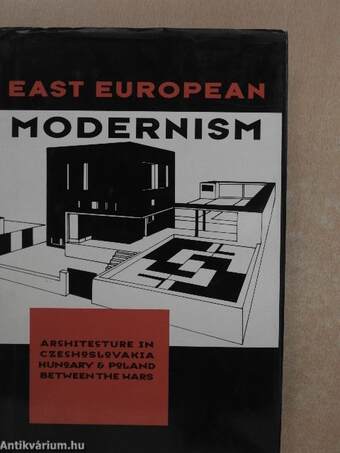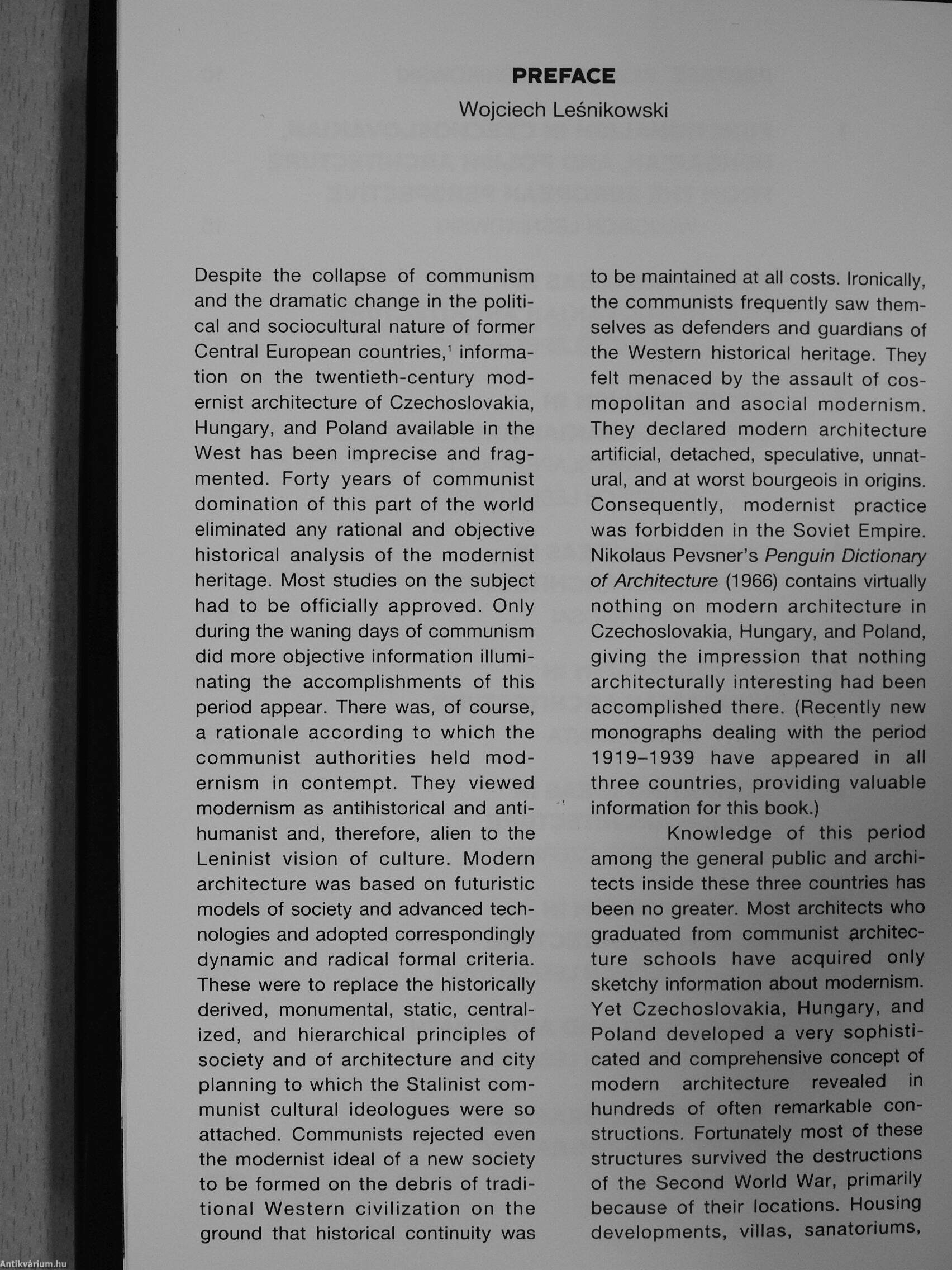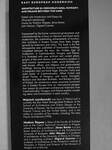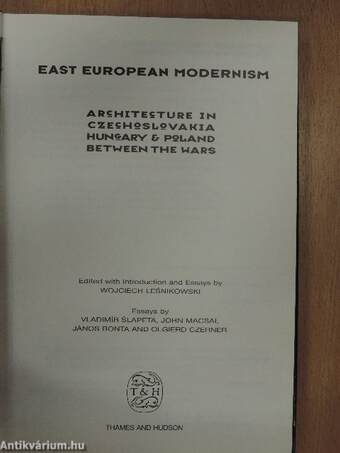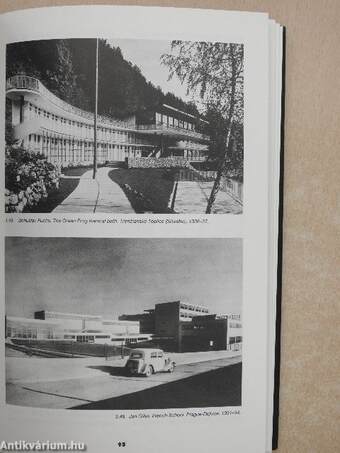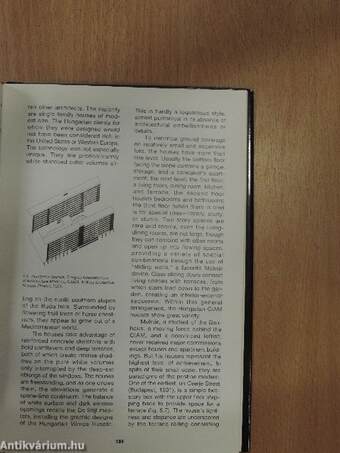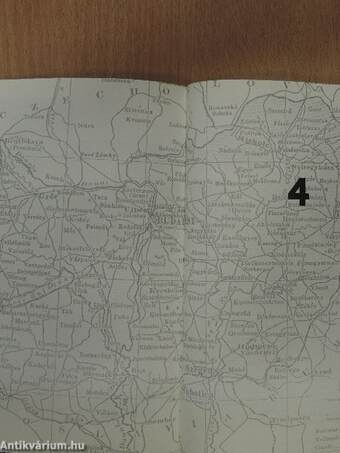1.067.327
kiadvánnyal nyújtjuk Magyarország legnagyobb antikvár könyv-kínálatát

VISSZA
A TETEJÉRE
JAVASLATOKÉszre-
vételek
East European Modernism
Architecture in Czechoslovakia, Hungary & Poland between the Wars
| Kiadó: | Thames and Hudson Ltd. |
|---|---|
| Kiadás helye: | London |
| Kiadás éve: | |
| Kötés típusa: | Varrott keménykötés |
| Oldalszám: | 304 oldal |
| Sorozatcím: | |
| Kötetszám: | |
| Nyelv: | Angol |
| Méret: | 24 cm x 16 cm |
| ISBN: | 0-500-34151-6 |
| Megjegyzés: | Fekete-fehér fotókkal, illusztrációkkal és térképekkel. További fotósok a könyvben. |
naponta értesítjük a beérkező friss
kiadványokról
naponta értesítjük a beérkező friss
kiadványokról
Előszó
TovábbFülszöveg
EAST EUROPEAN HODERHISM
ARCHITECTURE IN CZESH9SL9VAKIA, HUNSARY, AND PfiLAND BETWEEN THE MARS
Edited with Introduction and Essays by Wojciech Lesnikowski Essays by Vladimir Slapeta, Janos Bonta, John Macsai, Olgierd Czerner
Suppressed by the former communist governments and overshadowed by a focus on German and Dutch early modernism, the outstanding achievements of functionalist architects in Eastern Europe have been largely ignored by historians and critics. This book is the first rétrospective ever published of functionalist buildings completed between the wars, the 'Golden Age' of modernism, in Czechoslovakia, Hungary and Poland. It is illustrated with rare archivai and current photo-graphs of the most famous and exemplary projects in each country: sanatoriums, hotels, sports facilities, private houses, offices, and religious and governmental buildings. Among the illustrious architects whose work is presented here are Karei Teige, Bohuslav Fuchs and Josef Gocór of... Tovább
Fülszöveg
EAST EUROPEAN HODERHISM
ARCHITECTURE IN CZESH9SL9VAKIA, HUNSARY, AND PfiLAND BETWEEN THE MARS
Edited with Introduction and Essays by Wojciech Lesnikowski Essays by Vladimir Slapeta, Janos Bonta, John Macsai, Olgierd Czerner
Suppressed by the former communist governments and overshadowed by a focus on German and Dutch early modernism, the outstanding achievements of functionalist architects in Eastern Europe have been largely ignored by historians and critics. This book is the first rétrospective ever published of functionalist buildings completed between the wars, the 'Golden Age' of modernism, in Czechoslovakia, Hungary and Poland. It is illustrated with rare archivai and current photo-graphs of the most famous and exemplary projects in each country: sanatoriums, hotels, sports facilities, private houses, offices, and religious and governmental buildings. Among the illustrious architects whose work is presented here are Karei Teige, Bohuslav Fuchs and Josef Gocór of Czechoslovakia; Alfréd Forbât and József Fischer of Hungary; and Lucian Korngold, Barbara and Sta ni sta w Brukalski, and Bohdan Lachert of Poland. An introductory essay examines functional-ism in Eastern Europe from an international perspective; essays by prominent architectural historians from Czechoslovakia, Hungary and Poland explore compet-ing ideas and functionalism in each country.
Wojciech Lesnikowski was born in Poland and is currently the Don Hatch Distinguished Professor at the School of Architecture and Urban Design at the University of Kansas. He has practised architecture in Poland, France and the United States, and is the author or co-author of four books, including The New French Architecture (1990).
Vladimir Slapeta is Dean of the Faculty of Architecture at the Czech Technical University in Prague, where he is also a professor; János Bonta is a professor emeritus of architecture at the Polytechnical University of Budapest; John Macsai is a professor of architecture at the University of Illinois at Chicago, and a practising architect; Olgierd Czerner is a professor of architecture at the Polytechnic Institute of Wroctaw in Poland and Director of the Museum of Modern Art in that city. Vissza
Témakörök
- Idegennyelv > Idegennyelvű könyvek > Angol > Művészetek > Építészet
- Művészetek > Építészet > Korszakok, stílusok > XX. század > Egyéb
- Művészetek > Építészet > Kontinensek szerint > Európa > Egyéb
- Művészetek > Építészet > Kontinensek szerint > Európa > Magyar > Egyéb
- Művészetek > Építészet > Idegen nyelv > Angol
- Művészetek > Építészet > Összefoglalók > Külföldi
- Művészetek > Építészet > Összefoglalók > Magyar
- Művészetek > Építészet > Építészettörténet > Külföldi
- Művészetek > Építészet > Építészettörténet > Magyar
Megvásárolható példányok
Nincs megvásárolható példány
A könyv összes megrendelhető példánya elfogyott. Ha kívánja, előjegyezheti a könyvet, és amint a könyv egy újabb példánya elérhető lesz, értesítjük.



